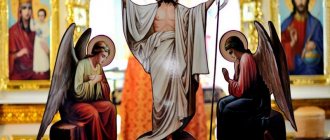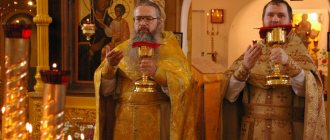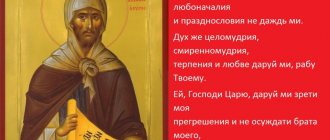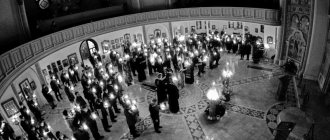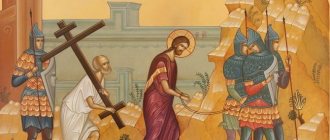In the Orthodox world, the calendar year begins with the Nativity Fast, which continues until the Nativity of Christ. On January 7, a continuous week begins, called the Christmastide Church, and among the people simply called Christmastide.
Traditionally, multi-day fasts are intended for introspection, prayer and spiritual deeds. During fasting, there are special rules that cannot be broken. As a rule, the week is divided into Monday, Wednesday and Friday, when you can only eat food, Tuesday and Thursday, when you can eat hot food without oil, and Saturday and Sunday, when you can add vegetable oil to your dishes.
Continuous weeks serve as a consolation after many days of fasting, help to stock up on strength before the upcoming spiritual test (after all, there are several fasts), and do not allow one to imagine oneself as “eternally limiting oneself as a faster.”
What is a continuous week?
A continuous week is the week from Monday to Sunday, when even weekly fasts on Wednesday and Friday are canceled, and it is allowed to eat any food.
Such weeks are often preparatory to the 4 main Lents (Great, Petrov, Dormition and Nativity) and are tied to church holidays.
LiveInternetLiveInternet
RUSSIAN DAYS OF THE WEEK!
How many people know that the Slavs called a week not a unit of time of seven days, but the last day of the week, now called Sunday? For a long time in Rus', “week” was called sedmitsa (seven days), while week (from “non-doing”, “non-working”) was the seventh, day off of the week. It is also likely that the ancient Slavic “week” initially consisted of five days, and it became seven days later. Where did the names of the days come from and why are there 7 of them in the modern week? It is known that the seven-day version of the calendar was not the only one; there are references to 3, 5, 8 (Roman “eight days”, in which the days were “numbered” with letters from A to H, where N is market day), 9 (among the Celts), 10 (ancient Egyptian decades), 14 days (more precisely, 14 nights among the ancient Germans). Historical sources date the first mention of a seven-day week to the period of Ancient Babylon (about 2 thousand years BC), from there this tradition passed to the Jews, Greeks, Romans and Arabs. The Jewish historian Josephus Flavius already in the 1st century AD. writes: “There is not a single city, Greek or barbarian, and not a single people to which our custom of abstaining from work on the seventh day would not extend.” It is believed that India also adopted the 7-day rule from Babylon. For Jews and Christians, the Old Testament gives answers to these questions, from which it becomes clear that the seven-day structure of time was established by God. As is known, according to the biblical tradition: on the first day of creation light was created, on the second - water and firmament, on the third - land, seas and flora, on the fourth - the luminaries and stars, on the fifth - the animal world, on the sixth - man was created and he was commanded to multiply, but the seventh day was dedicated to rest. The seven-day week turned out to be very viable, even the transition from the Julian calendar to the Gregorian did not change the sequence of days, the rhythm was not disrupted. There is also an astronomical explanation for the seven-day period. 7 days is approximately a quarter of a lunar month. Observing the phases of the Moon was the most accessible and convenient way of measuring time for the ancients. A more subtle explanation can be found in the correspondence of the seven visible planets to the days of the week, and it is this logical development that sheds light on the origin of the modern calendar names for the days of the week. It is not known exactly what day the week began and ended in Ancient Rus'. It is believed that in everyday life the beginning of the week was Sunday and the end of Saturday, but in church practice the week usually began on Monday and ended on Sunday. After the adoption of Christianity in 988-989. In Rus', the calendar “from the creation of the world” was introduced (based on the Byzantine model) and the New Year was celebrated on March 1. Under Ivan III, from 1492 (7000 from the “creation of the world”), the New Year began to be celebrated on September 1. In 1700, Peter I introduced a new (Julian) calendar “from the Nativity of Christ” and the New Year began to be celebrated on January 1. Under Soviet rule, the current Gregorian calendar was introduced in 1918, which is now ahead of the Julian calendar (old style) by 13 days (new style), so we also celebrate the old New Year (January 14). The modern international era is the era from the Nativity of Christ (in the literature it is designated: before R.H. and after R.H., before or after our, or new era). It was created in 525 by a Roman monk, papal archivist Dionysius the Small - a Scythian by origin. When compiling Paschals, Dionysius calculated the year of Christ’s birth - 754 from the founding of Rome or 284 before the beginning of the era of Diocletian. In the 6th century, this era spread in Western Europe, and by the 19th century in all Christian countries. In Russia, it was introduced by Emperor Peter I on January 1, 1700. Table 1. Names of the days of the week and week in different Slavic languages. Russian Monday Tuesday Wednesday Thursday Friday Saturday Sunday week Belarusian Panyadzedak Autorak Serada Chatsver Friday Saturday Nyadzelya Tydzen Ukrainian Monday Tuesday Wednesday Thursday Friday Saturday Week Thursday Bulgarian Monday Tuesday in a row Thursday Thursday Petak Saturday week week Serbo-Croatian (Cyr.) Monday day utorak wednesday thursday petak Saturday of the week Serbo-Croatian (lat.) ponedjeljak utorak srijeda cetvrtak petak subota nedjelja tjedan Slovenian ponedeljek torek sreda cetrtek petek sobota nedelja teden Macedonian Monday Tuesday Wednesday Thursday petok sabot week week Slovak pondel ok utorok streda štvrtok piatok sobota nedel'a týždeň Czech pondělí úterý středa čtvrtek pátek sobota neděle týden Upper Sorbian póndźela wutora srjeda štwórtk pjatk sobota njedźela tydźeń Polish poniedziałek wtorek środa czwartek piątek sobota niedziela ty dzień In Ancient Rus', it was known to count time in weeks, seven days in each. This is where the Old Russian name for the week “week” comes from. Unlike many ancient calendars, in which the days of the week were named after the names of the planets dedicated to the ancient gods, the Old Russian names of the days of the week reflected their ordinal position relative to “Sunday,” called “week” (from “not to do” - not to work, since this It was a day of rest). Monday or Sunday (“after a week”, “after weeks”). Week is the original Slavic name for the seventh day of the week (now Sunday), when no one does anything. Monday is a hard day, as you know. And the name is long, and the signs are harsh: don’t start any new business - you’ll fail, don’t set off on the road - you won’t get there, don’t invite guests - they’ll stay there all week. On this day, you should also not make kvass (a traditional ancient Russian drink), because mermaids bathe drowned people in such kvass; You can’t talk to any witches or sorcerers, otherwise they will turn into a dog and scare you at night. Two activities that you can safely do on Monday, according to popular wisdom, are sneezing and pulling teeth. Sneezing on this day means gifts, and teeth tear without any complications. Monday in English - Monday, directly echoes the Moon - Moon, even more clearly Dies Lunae (Latin), Lundi (French), el Lunes (Spanish), Lundei (Italian). The names of Monday from the northern languages, for example Mandag (Swedish), Maanantai (Finnish), Mandag (Danish) are associated with the ancient Germanic Manadagr - day of the moon. In Hindi, Monday is Moon Day. Tuesday (“second after the week”). The name of this day comes from the numeral “second”. In the name of Tuesday Dies Martis (Latin), Mardi (French), el Martes (Spanish), Martedi (Italian) we can easily recognize the planet Mars. In Tiistai (Finnish), Tuesday (English), Dienstag (German) and other languages of this group, the name of the warlike ancient Germanic god Tiu (Tiu, Ziu) - an analogue of the ancient Greek Mars - is hidden. In Hindi, Tuesday is Mars Day. Wednesday or Wednesday (middle of the week) comes from the adjective “average”. This day stands in the middle only if you count from the week (Sunday). According to popular beliefs, on Wednesday you should not move to a new place - you will not live there for long, hire workers - they will run away and steal, do not start any new business and do not mention witches and evil spirits. The Slavic names “Wednesday”, “Wednesday”, as well as Mittwoch (German), Keskeviikko (Finnish) contain the idea of the middle of the week. The Old Russian name for the environment “tertiary” is rare. The Italian god Mercury is easily recognized in the following names of the environment: Dies Mercury (Latin), le Mercredi (French), Mercoledi (Italian) and el Miercoles (Spanish). Wednesday (English) comes from Wodensday, meaning the day of Woden (Wotan). The same character is hidden in Onstag (Swedish), Woenstag (Gol.), Onsdag (Danish). Woden is an unusual Germanic god, depicted as a tall, thin old man in a black cloak. This god became famous for the invention of the runic alphabet, which draws a direct parallel with the patron god of written and oral speech - Mercury. According to legend, Woden (Wotan) sacrificed one eye for the sake of knowledge. Let us also note that astrologically Mercury is considered an average, asexual planet - neither male nor female. In Hindi, Wednesday is Mercury Day. Thursday (fourth day of the week). In Slavic languages, the name of this day comes from the numeral “fourth”. On Thursday, one should also not make kvass, so that “the crow would not bathe its children in it.” The Latin name for Thursday Dies Jovis, Jupiter Day, gave rise to Jeudi (French), Jueves (Spanish), Giovedi (Italian), but Thursday (English), Torstai (Finnish), Torsdag (Swedish and Danish) , Donnerstag (German) and other similar names have a direct connection with the Scandinavian thunder god Thor, an analogue of the Roman Jupiter. In Hindi, Thursday is Jupiter's day. Friday (fifth day after the “week”). Friday, according to popular belief, is worse than Monday and Wednesday combined. Married women were not allowed to wash their hair, poultry farmers were not allowed to put chickens on eggs, men were not allowed to do women’s work (for every Friday was considered “Women’s Day”), otherwise they would face either nail eaters or incurable hangnails. And, of course, you can’t start a new business: whoever starts a new business on Friday will back off. The Roman goddess Venus is clearly visible in the names of Friday: Vendredi (French), Venerdi (Italian), a little more muted in Viernes (Spanish), while the English Friday, Fredag (Swedish), Freitag (German) has a parallel with the Scandinavian goddess fertility and love by Freya (Frigge), an analogue of the Greek Aphrodite and Roman Venus. In Hindi, Friday is Venus Day. Saturday (in Slavic “six” “six”) got its name from the Hebrew word “sabbath” (Sabbath, Sabbath), in Judaism - the seventh day (Jewish “week”), on which one should abstain from work. The modern Russian expression “six” is also associated with this same day of the week in the meaning of “incorrect”, “undefined”, “two-faced”, since the original name of the day of the week was not preserved in any of the Slavic languages, but was, in fact, forcibly applied to us the famous word "Saturday". Together with Christianity, this name for this day spread throughout Europe, reached Rus' and already acquired its modern meaning. Saturday is a bright, good, easy day. Unlike Jewish laws, Russian omens, on the contrary, advise starting new things on this day, going on the road, moving to a new place of residence. And don't forget to change your linen on Sunday. The name of the Roman god Saturn is clearly visible in Saturday (English) and Saturni (Latin). The Hebrew name for "Saturday", el Sabado (Spanish), Sabato (Italian) and Samedi (French) go back to the Hebrew "Sabbath", meaning rest and peace. In this sense, one of the astrological meanings of Saturn – immobility and concentration – successfully resonates with Shabbat. It is interesting that the Slavic languages, in this respect, are united with the Latin ones, and their “Saturday” also comes from “Sabbath”. Lauantai (Finnish), Lordag (Swedish), Loverdag (Danish) are similar to the ancient German Laugardagr and mean “day of ablution,” from which we learn that the ancients had to wash themselves once a week. In Hindi, Saturday is Saturn Day. Sunday (Resurrection) is a weekly Christian holiday, which in Rus' became the name of the day of the week, established in honor of the resurrection of Jesus Christ on the third day after the crucifixion. Russian folk signs advise dedicating this day to God. This is the Day of the Sun in Latin, English and German, and in many languages the day is referred to by various variations of the word "Sun/Son" (Sun). Domingo (Spanish), Dimanche (French), Domenica (Italian) in translation mean “Day of the Lord” and are probably a “layering” brought to Europe along with Christianity. Russian "Sunday" appeared in the same way, replacing the old name for this day "week", successfully preserved in other Slavic languages (as can be seen from Table 1). Table 2. Comparison of the names of the days of the week, the gods and planets corresponding to them. Day God Planet Description (astrologer) Examples Monday Rod? Moon Guardian of rhythms and traditions. Modern Rodonitsa (Radunitsa), Spiritual Day. Tuesday Morena Mars Energy, co-being and gathering. Naviy day, Deceased Rodonitsa, Soulful commemoration. Wednesday Yarila? Mercury Communication, change and renewal. On Wednesday, on the eve of the Annunciation, old straw beds that have compacted over the winter are burned. Seeing off the mermaids. Thursday Perun Jupiter, Sky Development, organization (of something), world order. Thursday on the eve of the Annunciation is called clean, that is, bright; On Maundy Thursday, peasants go to the ice hole and call for Spring. Modern Semik and Rusalny Velikden. Friday Lada, Makosh? Venus Understanding, harmony, beauty. Mokosh Day, Paraskeva Friday is a women's and girls' holiday. Saturday Stribog? Saturn Order and responsibility, connection with the past and future. Parents' Saturday before Maslenitsa, Dmitrievsky grandfathers, Klechalnaya parents' Saturday. Sunday Dazhdbog Sun Shine, brightness, authority. Red hill. No-work days are an old name for Sundays. The concept of “Sunday” appeared in Rus' only after the adoption of Christianity and, at first, only one day was called Sunday - the day the celebration of Easter began. Only in the 16th century did Sunday appear as a separate day of the “week”. The origin of the word “week” itself is a little more difficult to judge. Was it originally Russian or did it come along with the alphabet of Cyril and Methodius? If this word was part of the pagan ancient Slavic calendar, then why did it enter the Christian church language? The current Orthodox Christian calendar consists entirely of weeks. If we take into account that sedmitsa is still called “week” in Bulgaria and that the oldest Slavic letters in Cyrillic (IX-X centuries) were also discovered on Bulgarian territory, then the tangle begins to gradually unravel. And when it becomes known that the Greek brothers Cyril and Methodius from childhood spoke, in addition to Greek, the ancient Bulgarian language, then we can make the assumption that the “week” most likely comes from Bulgaria. According to one of the popular versions, the old Russian “week” (as a day) was called that because on this day they “didn’t do anything”, they rested. And Monday means that it comes after the “week” (current Sunday), Tuesday is the second day after the “week”... Wednesday, being in an undeniable sense the middle of the week, indicates that the beginning of the week falls on Sunday. It is also curious that the word “week” itself is a translation from the Greek apracos, i.e. non-doer, idle, idle. In other words, it is likely that the word “week” itself was introduced into Russian culture from the same place where Sunday came from. Table 3. Reconstruction of the original Slavic names of the days of the week. Modern week Slavic week Monday Monday, Monday Tuesday Tuesday, Tuesday Wednesday Wednesday, Wednesday. Treteinik Thursday Thursday, Thursday Friday Friday, Friday, Pyatak Saturday Six, Shesterik, Six Sunday Week Is it possible that there was another, more ancient week among the Slavs? It is quite obvious that Tuesday, Thursday and Friday contain the ordinal sense of the numeral in all Slavic languages. Even the environment, as is known from ancient sources, had a serial name - the third. If we count Monday as the first day, Tuesday as the second, and so on, then we have a problem with Wednesday not being in the middle of the week. Thursday becomes the middle of the week, which is not logical on all counts. How can we make sure that Wednesday is in the middle, Tuesday is the second, Thursday is the fourth, and Friday is the fifth day of the week? There is only one way to do this. It should be taken into account that the ancient week among the Slavs, and in Rus' in particular, could well have been 5 days long. In this case, Wednesday will be in the middle and the ordinal names of the days of the week will correspond to their order. The hypothesis is that the ancient week was five-day, and the other two days (week-end) - Saturday (Shabbat) and week-Sunday were attached to the Russian language later. Sources: Slavic Library, Slavic Week
Types of weeks
During the year in the Orthodox calendar, the Church established five continuous weeks before one or another fast.
Holy Week
The end of the Nativity Fast will mark the beginning of Holy Week. Strictly speaking, it lasts not seven days, but 11. The week covers the period from the Birthday of Christ, who came into our world in the name of the salvation of humanity, to the Baptism of the Lord - from January 7 to 18 .
“Holy days” or “Holy evenings” have been revered in the Church since ancient times. These days, by Charter Pr. Savva the Sanctified was forbidden to fast, genuflect and marry.
The sanctity of the continuous week was violated by remnants of pagan holidays: for example, fortune telling.
Week of the Publican and Pharisee
The Week of the Publican and the Pharisee received its name thanks to the parable of the same name from the Gospel of Luke, which talks about the need for humility, rather than pride and exaltation of one’s virtues.
The Publican and the Pharisee are the heroes of the parable who came to repentance. The second convinced himself of his own exaltation and closeness to God so much that he stopped noticing his own pride, and the first sincerely admitted his sins and asked for forgiveness.
This Week is one of a series of preparatory weeks on the eve of Great Lent.
The Church Charter does not establish the exact date of the continuous week, because it is tied to the date of Easter. Such a week must take place 14 days before the start of the fast.
Week of the Prodigal Son
Before Great Lent there is another preparatory week - the Week of the Prodigal Son. The Gospel of Luke contains a parable that tells the story of a father and son. A son wandering around the world, having squandered everything that was in his soul and given by his father, returns home to sincerely beg for forgiveness, and receives it.
Drawing an analogy, before Great Lent it is necessary to repent of sins and return to the bosom of the church, hoping for His mercy.
Week of the Last Judgment
The last 7 days before Great Lent in Orthodoxy, the Parable of the Last Judgment is read at liturgies, and the entire week is dedicated to the memory of the departed, inveterate and not inveterate by the church. These days we should remember that God is a fair judge, and not only merciful.
Maslenitsa
Pagan Maslenitsa actually merged with the last preparatory week before Lent, the continuous Cheese Week, which is revered by the Orthodox Churches. In the Christian sense, during Cheese Week it is necessary to devote oneself to communication with neighbors and reconciliation with them.
The emergence of such a church tradition is associated with the vow of the Byzantine emperor Heraclius I, who waged a grueling war with the Persians. He made a vow not to eat meat a week before the start of Lent, and when the victory was won, the Church included such a rule in the Charter.
A distinctive feature of Cheese Week is food restrictions associated with the proximity of fasting. This week you can eat fish, dairy products, cheese and eggs, but meat dishes are no longer allowed.
It is recommended to partially observe fasting on Wednesday and Friday - abstaining from fish.
Bright Week
During Easter week, Jesus met with his disciples several times until they finally believed what had happened. The Savior’s last meeting was with the Apostle Thomas, who for the longest time refused to believe in the resurrection of the Lord and wanted to see the wounds and be convinced of the miracle.
Christ gave him such a chance by personally visiting Thomas, returning the student to the true path. The example of the apostle shows that the Church does not close the door to a person who wants to believe, but does not have the inner strength to do so.
The first week after Easter is called Bright Week - a time of joy, happiness, and a great miracle.
At this time, all services will be similar to Easter.
It is strictly forbidden to observe fasting, asceticism and even kneel. Throughout the whole week, people celebrate the Resurrection of the Lord: they rejoice and have fun. You can eat any food on all days.
(see "Number 7")
“Week” is a symbol of the fullness of the Revelations of the Will of God, proclaimed by the righteous for each period in the history of peoples.
- “And you shall observe the Feast of Weeks, the Feast of the Firstfruits of the Wheat Harvest, and the Feast of Gathering in at the end of the year;...” Ex.34:22
“Week” is called the “Feast of the Firstfruits of the Harvest”, i.e. the beginnings and completion of the moral and spiritual improvement of man through his fulfillment of the Will of God, following God’s Commandments. This is the “holiday of gathering” by a pious person his spiritual “fruits”, the result of his efforts on himself at the end of his life. This is a blessed “holiday” of the end of a person’s earthly life and his transition to Eternal Life, life outside the flesh. (see "Harvest", "Feast")
- “And on the day of firstfruits, when you bring a new grain offering to the Lord in your weeks, you may have a holy convocation; Do not do any work..." Numbers 28:26
“Weeks” are certain spiritual stages in man’s knowledge and implementation of the Will of God, his “fruits” and victories in changing his moral and spiritual state at certain stages of his life.
(“…then you shall celebrate the Feast of Weeks to the Lord your God, according to the diligence of your hand, according to what you will give, according to what the Lord your God blesses you with…” Deut. 16:10)
- “Count off seven weeks for yourself; begin to count seven weeks from the time the sickle appears in the harvest...” Deut.16:9
When in the Word of the Holy Scripture a person recognizes the Revelation of the fullness of the Will of God (“seven weeks”), and a person begins to fulfill it, from that time the spiritual improvement of his life begins, “the sickle will appear in the harvest,” i.e. the good consequences of his life will become obvious. (see "Harvest")
- “...then you shall celebrate the Feast of Weeks to the Lord your God, according to the diligence of your hand, according to what you will give, according to what the Lord your God blesses you with;...” Deut.16:10
The command of God, transmitted through Moses, to celebrate the “Feast of Weeks, depending on what God blesses” a person means that a person must follow God’s Commandments - this is his liberation from sin to the extent of the strength and understanding God has given to man. (see "Holiday")
- “But this people has a violent and rebellious heart; they retreated and walked; 24 And they did not say in their hearts: “Let us fear the Lord our God, who gives us the early rain and the latter rain in its season, who keeps for us the weeks appointed for the harvest.” 25 Your iniquities have turned this away, and your sins have removed this good thing from you.” Jer.5:23-25
The words “...keeps for us the weeks appointed for the harvest” mean that God “keeps the weeks,” i.e. protects the spiritual purity of His Laws, which are intended for spiritual purification, growth and “fruit” of human life - for the achievement of righteousness and Eternal Life.
- “I haven’t eaten any tasty bread; meat and wine did not enter my mouth, and I did not anoint myself with ointments until the completion of three weeks of days.” Daniel 10:3
The figurative expression “fulfillment of three weeks of days” means man’s knowledge of the One God, His Testaments; knowledge of Jesus Christ, His Teachings; knowledge of the Holy Spirit of the Will of God. (see “Number 3”, “Day”)

